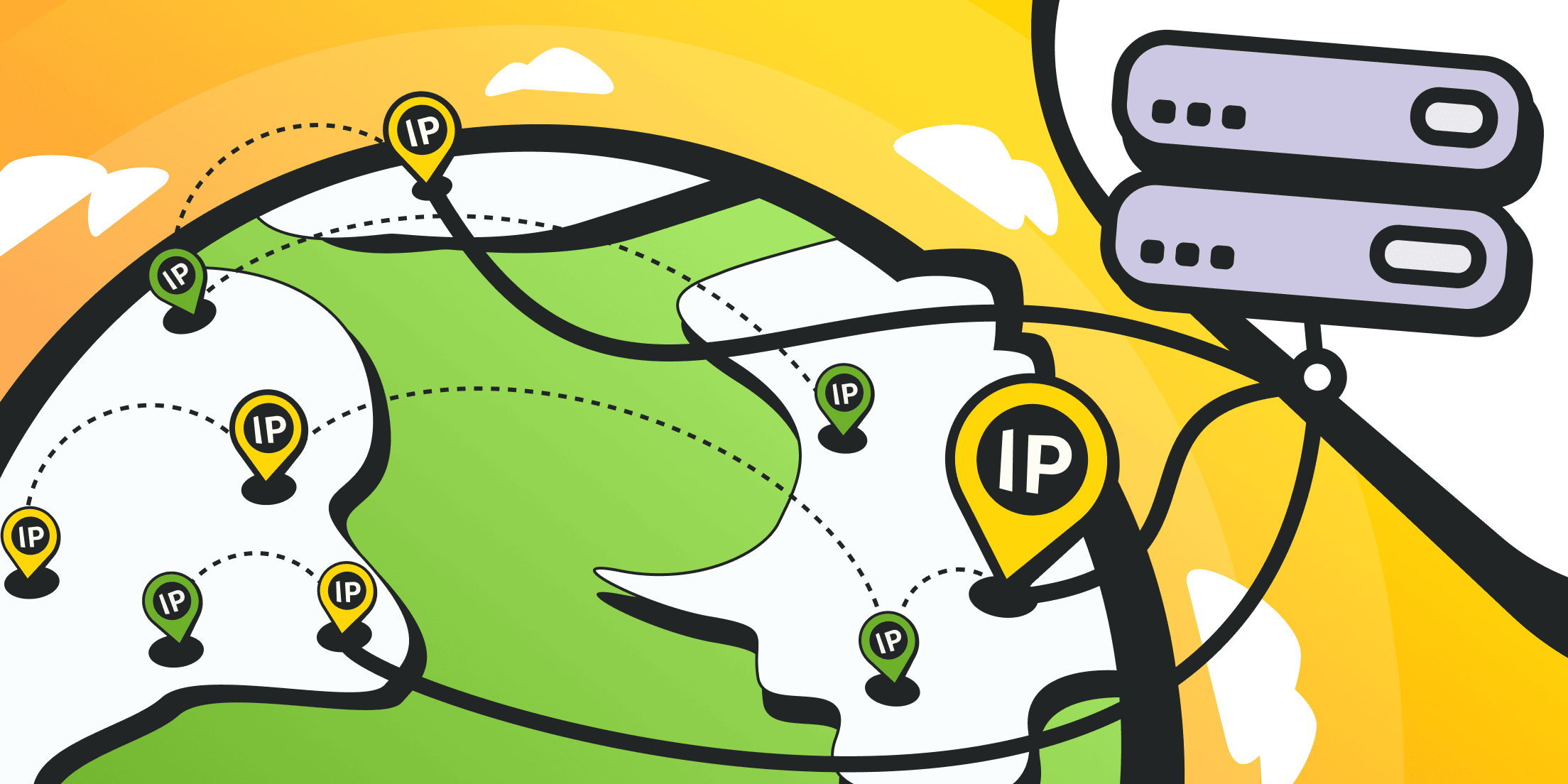Some websites and web services organize more than just protection - a real spam defense. This significantly complicates their parsing. The only effective way to access the pages and retrieve content is to change IP addresses as frequently as possible, almost with every new request.
It’s quite difficult to organize proxy rotation. The service provider or users can do this if they manage to set up the software correctly to control the proxies (more often, they even have to write their own scripts).
Below are maximum details about rotating (dynamic) proxies as a specific service in the market.
What Is a Rotating Proxy?
So, what are rotating proxies? A rotating, or dynamic, proxy server is a backconnect proxy that can change outgoing IP addresses based on a timer, with each new request, or by a special command. The command for rotation is given via an API interface or by following special links.
Rotating proxies are the direct opposite of static proxies.
For the target website, the parsing process appears as a large number of unique connections, making it literally unable to extract repeating automated requests from the same IP. They slip away from it.
Technically, rotation can also be completed by the client. For example, many specialized programs that work with parsing can discard non-working proxies and replace them with the next IPs from the list. This continues until another working address is found.
This approach is extremely inconvenient because:
- You need to keep your own proxy-related statistics;
- It's advisable to pre-check the IP operability, its ping, and connection speed in advance;
- As soon as the previous steps are complete, include them in the work.
Plus, you need to know which proxy is located where to avoid adding new problems to the protection systems of the target website or web resource.
A more appropriate scheme is to set up rotation logic on the proxy service's side. This way, the proxy service will know better where and which IP addresses it has, which ones are currently active, their current load, etc.
Since the proxy service provider's IP addresses are also not infinite, they alternate them among different clients and between different requests/sessions. Hence the name "rotating," as the proxies are rotated according to a certain scheme each time.
Demand creates supply. Therefore, special services for renting mobile or residential proxies with rotation have emerged on the market.
IP addresses of any type can be rotated as long as the service provider has a sufficient "margin of safety" in the form of a pool of active addresses. Some specialize only in specific types of addresses, while others can provide a comprehensive set of IPs.
By the way, Froxy can offer dynamic proxy types:
Benefits of Using a Rotating (Dynamic) Proxy

Let us clarify why rotating proxies are popular:
- Convenient Connection: Since rotating proxies operate on a feedback scheme, clients can connect them to their working software and services literally once, with just one line of code. All subsequent procedures for replacing outgoing IP addresses will be handled by the service operator. The IP for connection is the entry address into the proxy network and can remain static for the client.
- Successful Bypass of Protection Systems: The more addresses in the provider's pool, the longer the rotation period. It is difficult to exhaust and reuse millions of IPs. Therefore, even if an anti-fraud system remembers its clients, it cannot accumulate any information about them if a new IP is used with each request.
- Scalability and Speeding Up Data Collection Procedures: The same principle applies here. If there are many proxies, why not send requests to the target site in parallel? A simple example: if you parse a site not in one stream but in two, the processing time is cut in half. In three streams, it’s reduced to a third, etc. If the proxy provider offers high limits on parallel connections, you can handle up to several thousand simultaneous requests in one-time unit (as long as your software can manage such a data flow).
- Reduced Costs for Captcha Solutions: Captchas can create many problems. If there’s no way to solve captchas independently, you’ll need to involve specialized services for this, which rely on manual labor and are always paid. The fewer captchas you encounter during parsing, the lower your additional expenses will be. The only nuance is that to minimize the likelihood of encountering captchas, you need to use the right proxies - residential ones and, even better, mobile ones. The principle of bypassing captchas works the same way as bypassing blocks - if the system issues a captcha, you simply switch to the next proxy. That proxy should not have a captcha. If it does, you take the next proxy, etc.
- Increased Anonymity: Like all proxies, rotating proxies hide your real IP address and prevent its blocking.
- Precise Targeting: The larger the provider's IP pool and the wider its coverage, the more addresses there are in each individual location. Serious providers ensure targeting up to the level of cities and telecom operators.
- Convenient Rotation Conditions: This depends on the capabilities of the proxy service operator. However, even simple API commands are sufficient to create scripts of any complexity involving request quantities, timers, various conditions, triggers, etc. Typically, three standard schemes are used: one with IP retention, known as "sticky sessions" (to bind to a specific user session, for example, with mandatory account authorization), one with a fixed timer (IPs are replaced after a set period, automatically handled by the proxy service) and one that changes IP with each new request (any new requests through the proxy will be sent with a new IP) as well as one that operates via link/command through API (for all other situations). There’s also automatic rotation, which involves removing non-working IPs from the database and replacing them with active ones.
Downsides and Risks

- Depending on the rotation implementation options, proxies may temporarily go down. For example, this is how many individual mobile proxies work (clients essentially rent a real GSM modem, so each IP reset means disconnecting from the network and reconnecting). By the way, proxies from Froxy rotate instantly.
- Certain target websites may block many of these IPs if server proxies are rotating. The issue here is more about the type of addresses. Server IPs are easy to track and identify. Blocking them does not harm organic traffic since real users do not operate on these IPs (websites and web services do). Consequently, rotating proxy server solutions are not suitable for all tasks, which is why they are cheaper.
- The lifecycle of rotating proxies is usually short, especially if they operate on mobile or home devices (residential proxies with rotation). Therefore, it’s unlikely that you’ll be able to "own" the same address for several consecutive hours (not to mention days or weeks). This format can only be obtained by renting static and individual proxies.
- For the same reasons, rotating proxies have low stability and reliability, making it difficult to work with sites that require mandatory authorization. However, there is a small hack - just rent mobile proxies. Even mobile operators cannot guarantee that IPs will be fixed for their subscribers. Therefore, the rotation of mobile addresses does not pose any suspicions. If a new IP is selected with the same ASN number, it is considered completely natural.
Since quality rotating proxies involve residential or mobile addresses, their speed will always be lower than that of static proxies, which typically operate on server IPs (they function within high-performance server infrastructure).
Use Cases of Rotating Proxies
Do you know how to use rotating proxies? They are better suited for the following tasks:
- Usage with Anti-Detect Browsers: They can be used for SMM and SEO tasks, managing a large number of accounts, working with cryptocurrency exchanges, traffic arbitrage, trading on marketplaces, dropshipping, etc.;
- Content Parsing: This includes cases where your web service will operate on the basis of parsed content;
- Competitor Data Collection: This includes information on competitors’ prices, product range, audience reach, comprehensive market research, etc.;
- SEO Monitoring and Technical SEO Audits: Studying positions in search results, comparing with competitors’ websites, testing layouts, detecting code errors, parsing meta tags, analyzing web page structures, and checking text uniqueness. Learn more about proxies for SEO;
- Analyzing the Cleanliness of Advertising Partners: Checking the regions where ads are displayed, tracking targeting conditions, etc.;
- Sneaker Bots: Integration with software for trading branded sneakers;
- SMM Tasks: Managing multiple accounts, generating fake reviews and visits, collecting user data, mass liking and following, promoting groups, etc.
Mind that large websites are now implemented as full-fledged web applications. Their pages contain a significant amount of dynamic code and JavaScript. The latter requires the code to be executed directly in the browser; otherwise, the final HTML structure will be incomplete. Therefore, we recommend parsing pages not just with general libraries but also using headless browsers. These can emulate user behavior and help bypass popular types of traps in the code (by analyzing element visibility).
Using rotating proxies alone does not solve protection problems. To avoid blocks during parsing, certain rules must be followed:
- Monitor the intervals between requests (they should not be repeated; otherwise, it’s obvious that the traffic is automated);
- Set correct HTTP headers and user-agent strings;
- Bypass common traps (honeypots);
- Do not access the site too frequently;
- Mimic the behavior of real users as much as possible (organize manual input into forms, move the cursor randomly, scroll pages jerkily, etc.);
- Use headless or anti-detect browsers (both allow working via API). If you don’t want to install new browsers, use special libraries - web drivers (these are local servers that automate connections to existing browsers on the device). An example of such a library is Chromedp.
Conclusion and Recommendations

Rotating or dynamic proxies are an effective tool for bypassing complex blocks. No anti-fraud system can block all addresses on the internet. Therefore, access to a large pool of IPs allows you to break through even super-advanced security systems.
However, it’s important to remember that just having proxies is not enough. To ensure that parsing does not lead to blocks, you need to consider all related factors and tech nuances.
Moreover, much depends on the proxy quality. You can buy rotating proxies from Froxy because we provide access to a pool of over 10 million IP addresses. Our range includes dynamic server, residential, and mobile proxies. The number of simultaneous connections can be up to 1000, with more than 200 locations available. Rotation can occur on a timer, via API commands, or automatically (as addresses drop out). There are sticky sessions to maximize the connection's lifespan.




